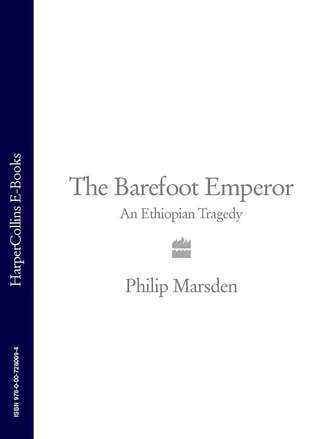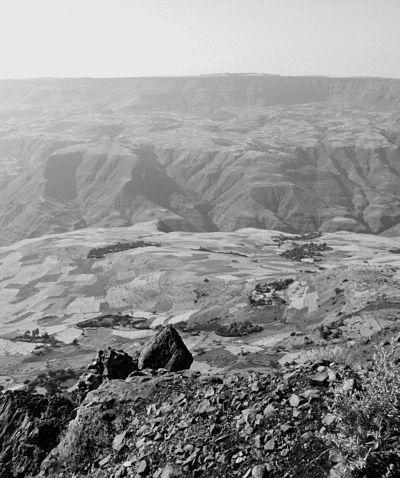
Полная версия
The Barefoot Emperor: An Ethiopian Tragedy
Ras Gugsa ruled for twenty-two years, and according to Zeneb, the Christian chronicler, those men who refused to submit to him had their penises cut off, while women lost their breasts.
In the 1830s, at the age of twelve, Ras Ali became head of the dynasty. During his regency his mother Menen ruled in his stead. Reports describe her variously as capricious, flirtatious, wanton and shameless. She governed from the half-ruined palaces of the city of Gondar. In their rough stone interiors she listened unseen to the affairs of the court, sending judgements and orders through her eunuchs. Outside stood crowds of farmers and soldiers, noblemen and shield-bearers, priests and beggars: ‘suppliants’, wrote Plowden, ‘who cannot obtain admittance, loudly crying their tale of woe … and perchance some man, once great – whose eyes have been extinguished by the order of her at whose door he is now sitting’.
The traditional rulers of Ethiopia, from the line that had embraced Christianity in the year AD330 but who traced their origins back to the union of King Solomon and the Queen of Sheba, had been in decline for years. King-makers and regional rulers plucked princes from the mountaintop prisons where they were kept from birth. They rarely lasted long on the throne. Soon Gondar was full of toppled emperors, living in penury. Many were crowned and ousted and crowned again – Tekle Giyorgis was enthroned six times. Menen herself took one in 1840 and placed him on the throne as King of Kings Yohannis III. He was sixteen at the time, and she married him in order to become itege or empress. He was on and off the throne for years, and grew into a drinker and rarely left his harem. He became known as Yohannis the Fool.
The people of the highlands, the Christian farmers whose land and stores were forever being plundered by shifting hordes of rebels and regional armies, sought solace in the traditions of their faith. The priests reminded them that from the death of Joshua until the rise of King David, the children of Israel suffered a period known as the Zemene Mesafint, the Time of Judges, and because there is nothing that happens that has not already happened in the Old Testament, the Christians of Ethiopia realised that they too were living in the Zemene Mesafint. Their trials were a punishment for their sins: ‘The children of Israel did evil in the sight of the Lord and served Baalim … And the anger of the Lord was hot against Israel, and he delivered them into the hands of spoilers who spoiled them, and he sold them into the hands of their enemies.’
The Ethiopian chronicles gave voice to the humiliation felt in the heart of every Christian highlander: ‘How is it that the kingdom is a laughing stock to the uncircumcised from the very beginning? How is it that the kingdom is the image of a worthless flower that children pluck in the autumn rains?’
Yet just as God had sent the Mesafint to punish his errant children, so one day he would end it. It had long been prophesied that in Ethiopia a great ruler would rise and restore the glory of the Christian kingdom. The longer the Mesafint went on, the more people remembered the words of the Fekkare Iyesus, stating clearly that a ruler would emerge to resurrect Ethiopia, banish her enemies and herald an era of peace, and that this ruler would be called Tewodros. In the 1830s a whisper began to be heard in the highlands. It reached the shores of Lake Tana, the villages of Begemder, and the stony streets of Gondar. He is come! Tewodros is come!
Outside a convent on the banks of the River Qaha, the saviour himself raised a horn to his lips:
‘I am the king whose name is Tewodros!’
In Gondar, the puppet emperor Sahle Dengel, ruling for the first of his four reigns, heard like Herod of the coming of the new king. He rose and sought him out. Within days, haloed by flies, the severed head of this Tewodros was hanging in the main square of Gondar.
Ras Ali and Menen remained in power. The wars raged on. The Zemene Mesafint continued.
4
On the coast, Walter Plowden was living a few miles inland from the unbearable heat of Massawa. In the village of Monculu, only a little less hot, he had built himself a house from palm matting and crude timbers. From his well he dug irrigation channels so that water could flow to the roots of vegetables and fruit bushes. He nurtured shrubs for shade.
Ten years in these regions had drained a little of his old energy. He was often ill. He spent days lying on his alga, bored and feverish, while shards of sunlight pierced the fibrous walls. His treaty had yielded nothing – no exports, no imports, none of the hoped-for traffic of skills. Ras Ali had been right.
Plowden performed his consular tasks as best he could. He wrote to London with reports on slavery, on the activities of the French, on missionaries. Every quarter he drew his salary: ‘I have the honour to state that I have been at my post, and in the execution of my duties …’
But it wasn’t much. ‘I am consul in name only,’ he wrote, ‘having no consular powers, no foreign commerce, no mercantile interests, and no British subjects to protect.’
He hated Massawa. He hated its climate, its humidity and haze. He called it the ‘slave depot of Turkey’. Successive Ottoman governors had tied him down with petty restrictions, hoping to drive him and other Europeans away. The last pasha was a particular menace to the consul, who complained frequently of his ‘misgovernment, bribery and oppression’. When Plowden wanted to repair his well, the pasha told him not one stone could be moved without permission from Constantinople. Within days the leaves of his shrubs and vegetables crunched to dust between his fingers.
Whenever he was able during those years, Plowden travelled up into Ethiopia. There he breathed the mountain air, climbed beneath a puff-clouded sky to ridges where you could gaze for a hundred miles or more. He bathed in bracing streams, slept easily in the cool nights. He visited John Bell, hoping to hear that the rebels were on the run, that Ras Ali was victorious and that he might at last take up residence in the highlands.
In 1850, Ras Ali suddenly made headway. Two of his greatest enemies – Dejazmaches Kasa and Wube – fell into line behind him. When he called them to campaign on his behalf, they came running. They brought their thousands of followers. A strange peace began to settle over the country, and many believed that the years of the Mesafint might just be over.
But in January 1853 Plowden wrote to his masters in the Foreign Office: ‘One of the great vassals of Ras Ali named Dejazmach Kasa … has rebelled.’ He reassured them that ‘at present the position and power of the Ras will be in no wise endangered’.
Four months later, he reported: ‘This rebel chief has gained another decisive victory over the combined forces of Ras Ali and Dejazmach Wube.’
Two months later: ‘Dejazmach Kasa is increasing in force.’
Three days later: ‘Dejazmach Kasa has completely defeated Ras Ali.’
The tufty-cheeked mandarins of the Foreign Office were not impressed. All they’d ever heard from their consul to Ethiopia was bad news from the interior and endless squabbles with the Turkish pasha.
‘Her Majesty’s government,’ wrote the permanent secretary, ‘were led by the representations made by you to expect that advantage would result to British interests from the conclusion of a treaty with the Rulers of Abyssinia … It appears however with your reports now before me, that there is little reason to expect such will be the case.’
Plowden was forced to agree. On 10 July 1854, six years after his original appointment as consul, he asked for his first leave.
Yet even as he was waiting, a new possibility emerged. As more news came in about Kasa, Plowden began the same volte-face that others had already performed in the highlands. Dejazmach Kasa, the wrecker of peace, was becoming the bringer of peace. Plowden delayed his departure.
On 3 March 1855 he wrote to tell Lord Clarendon that Dejazmach Kasa had defeated his last enemy, Dejazmach Wube. ‘There is at last some chance that Abyssinia may be united under one Sovereign, and such an one as shall merit the support and friendship of Her Majesty’s Government.’ The more Plowden heard of the new ruler, the more excited he became. Dejazmach Kasa had already abolished the slave trade, spoken out against battlefield mutilations. He had written to Plowden himself expressing his interest in ‘a sincere friendship with Europeans, more especially the English government’. When news reached him that Kasa had been crowned, Plowden was elated. He cancelled his leave and prepared to travel inland. He had waited nearly a decade for an opportunity like this. The Ethiopians had waited rather longer, and the promise of liberal reforms and foreign relations meant less to them than Kasa’s choice of name. He had been crowned Tewodros II.
5
How Kasa Haylu rose to become Tewodros II is a tale so often told in the villages and highlands of Ethiopia that the details have become stretched, added to and reshaped to make them fit a grander pattern. Even during his own lifetime they began to take on the form of more familiar tales, those of ancient folk heroes, of saints or the giants of the Old Testament. In particular his chronicles tell a story similar in many ways to the early life of the greatest of all kings, the father of Solomon – King David.
It was King David who had achieved what Ethiopian Christians longed for: he brought to an end the Zemene Mesafint. His story and the psalms attributed to him were a touchstone for educated Ethiopians who had all learnt by heart their ‘Dawit’, the psalms of David. As a boy Kasa completed his Dawit with great speed. In later years it was the story of David and the beauty of his psalms that he turned to in times of reflection and need. Those who met him said he carried a copy of the psalms wherever he went, and were struck by his command of them. Henry Dufton, who came to Ethiopia in the early 1860s, concluded that ‘he took for a standard – a model to which he could conform himself – his illustrious progenitor, King David’.
The strange thing is that many of the confirmed facts of Kasa’s early life really do fit with the young David, as did the physical prowess, the military skills and the intensely human virtues and flaws that shaped each of their reigns.
Like David, Kasa emerged not from the royal court, but from provincial obscurity. He was born in about 1820. His father was Dejazmach Haylu Welde Giyorgis, who died when Kasa was young. The truth about his mother troubled him all his life. His enemies taunted him with accusations that she was a camp-follower, a woman who had simply slipped into Haylu’s tent. They said she sold koso, a much-used purgative, on the street corners of Gondar. To others she was a noblewoman of astonishing beauty. Either way, it was she, Atitegeb, who ensured that he received many years of Church schooling. In biblical matters he could outquote many of the European missionaries who came to the country. He became proficient in Arabic.
He was still a boy, studying at the monastery of Mahbere Selassie when it was attacked by a warlord. The novices were slaughtered or castrated, but Kasa fled unharmed. He joined that nameless tribe of outlaws who haunted the remoter hills of the kingdom. He lived in caves, off the berries of the forest.
Then David departed and came into the forest of Hareth.
His strength with the spear, his skills as horseman, his courage and luck attracted others around him. He was little more than twelve years old. Sometimes he and his band would rob a caravan, or ambush the soldiers of the hated Oromo, and then he divided the spoils as David had divided the spoils of the Amalekites.
And when David came to Ziklag he sent of the spoil unto the elders of Judah, even to his friends, saying, Behold a present for you the spoil of the enemies of the Lord.
The years passed. Kasa fought in the lowlands to the west. The number of his victories grew so quickly and with such mysterious ease that Kasa began to see them as part of a plan devised by God. Then a great drought came and famine swept through the highlands, and Ras Ali and his mother Empress Menen could do nothing for the people. Out of the wilderness rode Kasa and his men with looted grain. Kasa gave the people money to buy tools, and he himself helped cut back the forest to plant grain. He showed them how to make the wild places green.
And every one that was in distress, and every one that was in debt, and every one that was discontented, gathered themselves unto him; and he became a captain over them.
In Gondar, Ras Ali’s mother, Empress Menen, saw the rise of Kasa and despatched an army to defeat him. It was too late. When her men came upon him, such was his reputation that they fled with hardly a fight.
Then Menen and Ras Ali and the Oromo chiefs became angry. Kasa’s support among the people was greater than theirs. They summoned him, that he might make an alliance with them.
And the princes of the Philistines were wroth with him; and the princes of the Philistines said unto him, make this fellow return, that he may go again to his place which thou hast appointed him, and let him not go down to battle, lest in the battle he be an adversary to us.
Menen and Ras Ali said to him: We will forgive all that you have done against us, if you will join us.
Kasa refused. So they offered him the hand of Tewabach, the daughter of Ras Ali.
And Saul said to David, Behold my elder daughter Merab, her will I give thee to wife; only be thou valiant for me.
Kasa was astonished; the daughter of Ras Ali was celebrated for her beauty. He accepted their offer.
And David said, Who am I? and what is my life, or my father’s family in Israel, that I should be son-in-law to the king?
It was a marriage that should not have worked – a bride from the dynasty Kasa was determined to destroy. But in the years to come, though they were often apart, the two developed an understanding that survived the desperate turbulence of their times, the wilder fringes of his personality, even, when it came, his decisive rebellion against her own father and grandmother, Ras Ali and Menen. She remained loyal to him, and he to her. She was probably the only figure in his adult life he ever learned to trust.
6
Nothing but the chronicles and legend survives of Kasa’s early rise to power – except four brief letters. They were written during his years in the lowlands of the west. They are all in Arabic and all addressed to local rulers in the borderless land between Ethiopia and Sudan. A boisterous confidence gushes from them. They were clearly dictated from the centre of a camp that never knew defeat, in which a powerful aura had already gathered around its leader.
In the letters Kasa refers to himself as ‘His Excellency, the honoured, the bravest of the brave and the greatest of horsemen, the mighty, the exalted, the praiseworthy, the owner of all the land, that is Shaykh Kasa …’ Demanding tribute from the Muslim rulers, he threatened: ‘Now, if you bring it, well and good. But if I come, then you’d better crawl back into whatever space is left in your mother’s womb … I am Kasa. No man can face me.’
At about this time, towards the end of 1846, Kasa made his boldest move. When Empress Menen left the old capital of Gondar with her troops, he marched in and claimed the city for himself. Kasa was now in control not only of the imperial capital but also of all the land to Lake Tana and beyond. On 18 June 1847, Menen met Kasa in battle. Kasa was victorious. He captured Empress Menen and her husband, the King of Kings, the Solomonic ruler, Yohannis the Fool.
In 1852, Ras Ali sent an army against Kasa. It was commanded by the great Ras Goshu, father of Biru Goshu. The two forces assembled on the plains of Gur Amba. Goshu’s men were pleased to find the rebel Kasa in such open country, so outgunned and so outnumbered. Goshu’s azmari, Tewfech, stood before the troops and sang a scurrilous song about Kasa to encourage them further:
Have you seen this scatterbrain
Coming down to Gur Amba, escorted by five hussies,
Fondling them
And followed by his usual band of loose women?
Kasa was again victorious. Goshu was killed, his men fled. Many were captured – including the azmari Tewfech.
‘Please,’ asked Kasa, ‘recite for me this rhyme of yours.’
When the azmari had finished, Kasa had him flogged to death.
Ras Ali then summoned all the military force of his kingdom. From Wollo to Gojjam, Lasta to Begemder, the negarits sounded. He asked Wube too to send an army. He placed them all under the lucky command of Biru Aligaz. They marched against Kasa, and in April 1853 met at Takusa. In the ranks there was great confidence. ‘This man of the lowlands,’ scoffed Ras Ali’s men, ‘this grower of red pepper – at last he’s come to fight us!’
‘How does he dare? We are ten to his one!’
‘Shush! How can you know what the Lord has decided?’
The Lord had decided on triumph for Kasa.
Kasa then began to move more quickly. He marched south. In May he burned Ras Ali’s capital at Debre Tabor. On 29 June 1853, Kasa finally clashed with Ras Ali himself, his own father-in-law, on the flat land around Ayshal. The chronicle tells of terrible bloodshed. Ras Ali’s troops fell like leaves from a wind-shaken tree. Those who were wounded and were unable to move perished from cold. Ras Ali fled the battlefield. He never recovered his power. The Zemene Mesafint was over.
Kasa still had some regional problems to sort out. A lightning march on Tigray wrong-footed its ruler and secured for Kasa the transfer to his camp of Abune Selama, the most senior cleric in the country. Kasa moved south, against Biru Goshu in Gojjam. For years Biru’s men had resisted Ras Ali’s vast army. But now the enemy was not led by the Oromo. Biru’s men refused to fight the invincible Kasa, with the figure of the abun behind him. Biru was captured without a shot being fired. He was dragged in before Kasa, a penitential stone pressing down on his shoulders.
‘If it had been me before you,’ asked Kasa, ‘what would you have done?’
‘Executed you,’ he murmured.
Kasa’s men wanted his blood, but he spared Biru. The rebel chief remained in chains for the next fourteen years. In the meantime Dejazmach Wube, said to be the wiliest man in the whole of Ethiopia, still ruled in the north. His regime had begun even before that of Ras Ali. Kasa sent a messenger to Wube, demanding tribute. ‘Who are you,’ responded Wube, ‘that I should pay you tribute?’
‘You shall see, great Goliath.’
In January 1855, Kasa marched north. He moved rapidly into the Simien mountains. Day after day, without rest, he drove his troops until they reached the great basin at Deresgie. High brown peaks ringed the skyline. A city of white tents was massed below them. Kasa turned to Yohannis, his liqemekwas, his chamberlain, and asked him to look at the tents through his glass.
Yohannis was the Englishman John Bell. With the defeat of Ras Ali, Bell had neatly swapped his allegiance and joined Kasa. Bell pressed the telescope to his eye and told Kasa – Yes, those are the tents of Wube.
Kasa’s men were exhausted. They were daunted by the prospect of battle against the great Wube. When Kasa ordered the advance they did not move. He rode out in front of them. ‘After all our victories, does this old man frighten you?’
The men did not budge.
‘Do his guns, charged with rags, chill your souls?’
Nothing.
Kasa made one final plea to them. ‘I will give you my name!’
Now one or two cheers rose from the ranks. Soon they spread and became a chorus, a battle cry. No highlander was immune to word-play, and Kasa had given them a pun. ‘My name’ in Amharic is ‘simien’– the name also of the native province of Wube.
The battle was not easy. It continued all day. Only when a group of Kasa’s men stumbled on a resting Wube and captured him was it decided. Kasa now controlled all of Tigray too – and from Wube’s treasury, safe on a high amba, he collected a great hoard of gold and silver. He handed out the money to his nobles, officers and soldiers according to rank. Such was the quantity that he continued to do so for months afterwards. The rifles he found were so numerous they were hard for his men to carry. There were also two cannon.
Two days later, in the presence of both Abune Selama and the ichege, the country’s chief monk, Kasa was crowned.
Dejazmach Kasa did not yet take at this stage the title King of Kings, or claim to be the heir of Solomon. He did better than that.
‘I will give you simien,’ he had promised his troops days earlier. ‘I will give you my name.’ He promised an end to generations of oppression, to centuries of waiting – Kasa became Tewodros.
‘At my birth,’ he wrote, with echoes of King David, ‘God picked me up from the dust, gave me strength, raised me up and by Divine power, I chased away the Galla.’
Tewodros’s success lay not just in an astonishing series of military victories. He had something of that curious mystique that gathers round certain men, the impression that just a little of God’s energy flows directly through them. Although it failed to convince many of the old nobility, Tewodros’s charisma was more effective than any number of big guns, and remained with him throughout all the heady years of his reign, surviving his caprices, his violence, his self-destructive manias, the eventual depletion of his forces, and even his death.
II

Jidda gorge
7
Down in the heat of the Jidda gorge, Walter Plowden waded across the thigh-deep river and began to climb. High above him, some 4,000 feet, were the cliffs of the Delanta plateau. Up there was Tewodros’s camp, with his 50,000 soldiers and 100,000 followers. As the slope steepened, so the paths filled. The British consul passed scouts and sutlers, fell into step with water-carriers, wood-carriers, mules laden with grain, shepherds and stockmen driving their beasts to feed the emperor’s troops. Once he reached the plateau a group of mounted generals came out to escort him in to camp. Flautists played beside them. Drummers beat their goatskin tympana. As the party approached the open ground at the heart of the camp, with its reception tent, a volley of muskets was fired.
Inside, the consul blinked in the sudden darkness. As his eyes adjusted, he saw the emperor for the first time.
Tewodros was sitting on a divan, dressed in gold-threaded robes. The imperial crown lay on a cushion beside him, hung with pendants of silver filigree. The sword of state was held above him. Abune Selama and the ichege sat on high chairs on either side. Standing in attendance were dozens of officers. Plowden lowered himself to the carpet.
The earlier portraits he gives of other nobles – Wube and Biru and Merso, even Ras Ali – make them all larger than life. But none was painted with the same fascination as that of Tewodros. Plowden was at once struck by his physique – his fitness, his poise and his youth. His face was powerful and handsome, with thin lips and hair running back down to his shoulders.
Plowden stayed two weeks in the Delanta camp, and afterwards wrote an extensive report for his impatient masters at the Foreign Office. It remains one of the most detailed portraits of Tewodros at any stage, but certainly in this moment, in the first months after his coronation, flushed with his own success.





